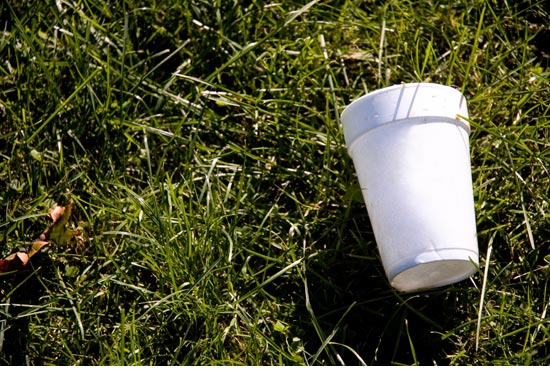County says so long to Styrofoam [updated]
September 20, 2010
Los Angeles County officials are preparing to say good-bye to a product that literally won’t go away—Styrofoam.
Joining a national environmental movement, the Department of Public Works is recommending that L.A. County agencies and concessionaires be barred from using food containers made of expanded polystyrene, commonly known by the brand name Styrofoam. Instead, they’d be required each year to purchase millions of cups and plates composed of a variety of quickly degradable and recyclable materials.
The move is a prelude to the possible enactment of a broader—and more controversial—prohibition at food and retail outlets in the county’s unincorporated areas. That prospect, still at least a year away, already has drawn fire from the manufacturers’ trade group, the American Chemistry Council, which recently spent huge sums successfully lobbying against a Sacramento bill that would have banned single-use plastic bags.
In a report to the Board of Supervisors, public works officials cited a litany of environmental dangers widely associated with expanded polystyrene products, which are used by consumers for only minutes but can take generations to deteriorate. As the report notes, these plates and cups consume inordinate space in landfills or end up as litter that blights communities and often ends up in the ocean, endangering marine life. Moreover, according to the report, expanded polystyrene releases hazardous chemicals as it breaks down in the natural environment.
The board is scheduled to vote Tuesday on the matter.
Pat Proano, who heads public work’s environmental division, said the proposed ban should send a strong signal to reluctant business owners that the county is “willing to do this in our own house—that we’re willing to walk the talk.”
Proano said the proposal, based on a board motion passed more than three years ago, took so long because his department wanted to engage the business community and “make it more of a collaborative effort.” To that end, the county hired a consulting firm in late 2008 to assess the impact of expanded polystyrene products and suggest a hierarchy of environmentally-friendly substitutes. In the end, the consultant and the county were largely of a single mind, Proano said.
Although the public works department is recommending that the purchase of expanded polystyrene food containers be prohibited within 60 days of approval, there are exemptions for several of the biggest users, who’ll need more time to prepare or who have contracts with vendors that will need to expire before product changes can be made.
Some departments, such as Beaches & Harbors and Parks & Recreation have already begun the phase-out.
At this point, the Sheriff’s Department, which uses more expanded polystyrene than any county agency, would be entirely exempted from the ban. According to county officials, it would cost the department nearly 300% more to purchase environmentally friendly products that inmates would not be able to fashion into weapons.
“You can’t do much with Styrofoam,” said Jerry Plummer, purchasing manager of county’s Department of Internal Services. “You can’t grind it down to make a knife.”
So the Sheriff’s Department, Plummer said, is entering into a pilot-project contract with a polystyrene recycler who is purchasing a giant washer to remove the jail-house food. The Styrofoam will then be ground up for “cheap picture frames” and other products, Plummer said.
“Because of the county’s size,” Plummer said, “nobody is doing this kind of thing out there on our scale.”
Posted 9/20/10
Updated 9/21/10:
Supervisors voted unanimously to phase out Styrofoam use in county facilities and gave Public Works officials a year to study whether a ban should be enacted in unincorporated areas of the county. Board chair Gloria Molina called the action a “very monumental opportunity” and a “leadership step” for the county. Supervisor Zev Yaroslavsky concurred, noting the symbolic and practical importance of having the immense county workforce go Styrofoam-free. “When we sneeze, the rest of the county catches a cold,” he said.
Looking ahead to a possible broader ban, however, Supervisor Don Knabe introduced a motion, adopted by the board, that directs Public Works to explore whether there is “appropriate infrastructure” in place to ensure that any Styrofoam alternatives don’t end up causing environmental problems of their own.













 405 bridge work causes a stink
405 bridge work causes a stink
